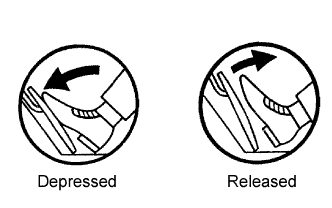Dtc P2121 Throttle / Pedal Position Sensor / Switch D Circuit Range / Performance
DESCRIPTION
WIRING DIAGRAM
INSPECTION PROCEDURE
READ VALUE USING INTELLIGENT TESTER (ACCELERATOR POSITION NO. 1, ACCELERATOR POSITION NO. 2)
CHECK WIRE HARNESS (ACCELERATOR PEDAL POSITION SENSOR - ECM)
REPLACE ACCELERATOR PEDAL ROD ASSEMBLY
CHECK WHETHER DTC OUTPUT RECURS (ACCELERATOR PEDAL POSITION SENSOR DTCS)
DTC P2121 Throttle / Pedal Position Sensor / Switch "D" Circuit Range / Performance |
DESCRIPTION
- HINT:
- These DTCs are related to the accelerator pedal position sensor. The troubleshooting procedures for the accelerator pedal position sensor are in the flowchart below.
- Refer to DTC P2120 (Toyota Fortuner RM000000PFY0J0X_01.html).
DTC No.
| DTC Detection Condition
| Trouble Area
|
P2121
| Conditions (a) and (b) continue for 0.5 seconds:
(a) Difference between VPA1 and VPA2 exceeds the threshold
(b) IDL is OFF
| - Accelerator pedal position sensor circuit
- Accelerator pedal position sensor
- ECM
|
WIRING DIAGRAM
Refer to DTC P2120 (Toyota Fortuner RM000000PFY0J0X_08.html).
INSPECTION PROCEDURE
- HINT:
- Read freeze frame data using the intelligent tester. Freeze frame data records the engine conditions when a malfunction is detected. When troubleshooting, freeze frame data can help determine if the vehicle was running or stopped, if the engine was warmed up or not, if the air-fuel ratio was lean or rich, and other data from the time the malfunction occurred.
| 1.READ VALUE USING INTELLIGENT TESTER (ACCELERATOR POSITION NO. 1, ACCELERATOR POSITION NO. 2) |
Connect the intelligent tester to the DLC3.
Turn the ignition switch ON and turn the tester ON.
Enter the following menus: Powertrain / Engine and ECT / Data List / Accelerator Position No. 1 and Accelerator Position No. 2.
Read the value.
- Standard voltage:
Accelerator Pedal
| No. 1 Accelerator Position
| No. 2 Accelerator Position
|
Released
| 0.5 to 1.1 V
| 1.2 to 2.0 V
|
Depressed
| 2.6 to 4.5 V
| 3.4 to 5.0 V
|
| 2.CHECK WIRE HARNESS (ACCELERATOR PEDAL POSITION SENSOR - ECM) |
Disconnect the A22 accelerator pedal position sensor connector.
Disconnect the E14 ECM connector.
Measure the resistance of the wire harness side connectors.
- Standard resistance:
Tester Connection
| Specified Condition
|
A22-6 (VPA) - E14-18 (VPA)
| Below 1 Ω
|
A22-5 (EPA) - E14-20 (EPA)
| Below 1 Ω
|
A22-4 (VCPA) - E14-26 (VCPA)
| Below 1 Ω
|
A22-3 (VPA2) - E14-19 (VPA2)
| Below 1 Ω
|
A22 (EPA2) - E14-21 (EPA2)
| Below 1 Ω
|
A22-1 (VCP2) - E14-27 (VCP2)
| Below 1 Ω
|
A22-6 (VPA) or E14-18 (VPA) - Body ground
| 10 kΩ or higher
|
A22-5 (EPA) or E14-20 (EPA) - Body ground
| 10 kΩ or higher
|
A22-4 (VCPA) or E14-26 (VCPA) - Body ground
| 10 kΩ or higher
|
A22-3 (VPA2) or E14-19 (VPA2) - Body ground
| 10 kΩ or higher
|
A22-2 (EPA2) or E14-21 (EPA2) - Body ground
| 10 kΩ or higher
|
A22-1 (VCP2) or E14-27 (VCP2) - Body ground
| 10 kΩ or higher
|
| | REPAIR OR REPLACE HARNESS AND CONNECTOR |
|
|
| 3.REPLACE ACCELERATOR PEDAL ROD ASSEMBLY |
| 4.CHECK WHETHER DTC OUTPUT RECURS (ACCELERATOR PEDAL POSITION SENSOR DTCS) |
Connect the intelligent tester to the DLC3.
Turn the ignition switch ON and turn the tester ON.
Clear DTCs (Toyota Fortuner RM0000010E700JX.html).
Start the engine.
Allow the engine to idle for 15 seconds.
Enter the following menus: Powertrain / Engine and ECT / DTC.
Read DTCs.
- Result:
Display (DTC Output)
| Proceed to
|
P2121
| A
|
No output
| B
|

